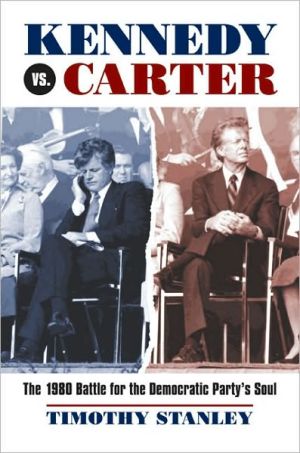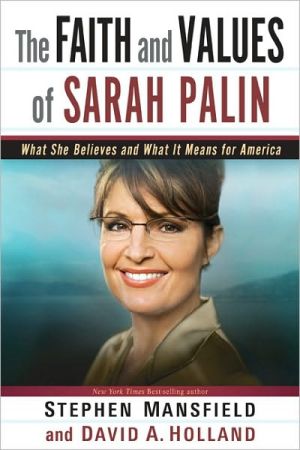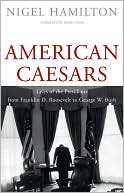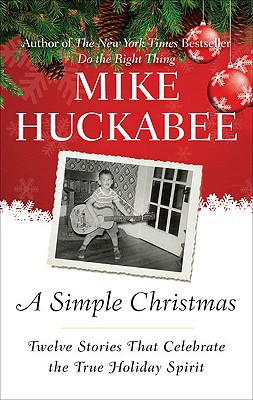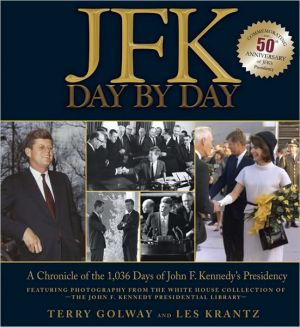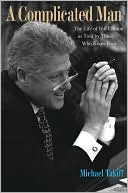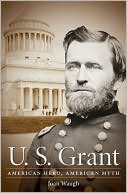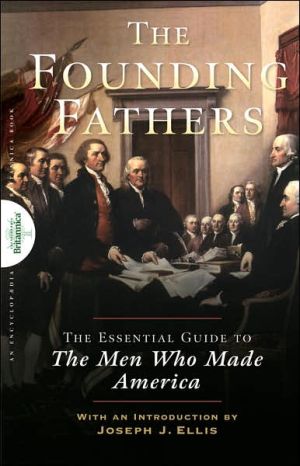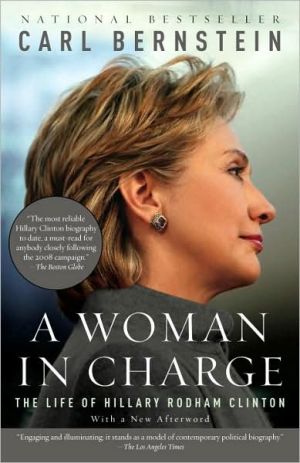Kennedy vs. Carter: The 1980 Battle for the Democratic Party's Soul
The late Edward Kennedy's liberal credentials were unimpeachable, and perhaps never as much on display as when he challenged incumbent Jimmy Carter for the presidency. Most accounts of modern U.S. politics view Ronald Reagan's landslide election in 1980 as a conservative realignment of the American public-and Kennedy's defeat in the Democratic primaries as the last hurrah of New Deal liberalism. Now an astute observer of the American scene reexamines those primary battles to contend that...
Search in google:
The late Edward Kennedy's liberal credentials were unimpeachable, and perhaps never as much on display as when he challenged incumbent Jimmy Carter for the presidency. Most accounts of modern U.S. politics view Ronald Reagan's landslide election in 1980 as a conservative realignment of the American public-and Kennedy's defeat in the Democratic primaries as the last hurrah of New Deal liberalism. Now an astute observer of the American scene reexamines those primary battles to contend that Kennedy's insurgent campaign was more popular than historians have presumed and was defeated only by historical accident and not by its perceived radicalism.Timothy Stanley takes a new look at how Jimmy Carter alienated his own supporters, why Ted Kennedy ran against him, what the Kennedy campaign has to say about America in the 1970s, and whether or not the 1980 election really was a turning point in electoral history. He tells the story of a struggle for the soul for a party bitterly divided over how to respond to economic decline, cultural upheaval, and humiliation overseas. And in the telling, he offers both a comprehensive narrative of the primaries and a joint biography of the two men who struggled for their party's leadership.Stanley's comprehensive research draws on more than a dozen archives as well as interviews with nearly thirty key historical players—including George McGovern, Walter Mondale, Gary Hart, and Mike Dukakis—and also makes creative use of polling data to recreate the ebb and flow of the election season. What emerges is not only the story of a campaign but also a revisionist history of a misunderstood decade-one most often defined by religious reawakening, chronic inflation, and the tax revolt that revived Republican fortunes. Yet Kennedy's crusade to rebuild the ailing New Deal coalition of ethnic minorities, blue-collar conservatives, and firebrand liberals was popular enough to suggest that Americans were neither liberal nor conservative but, instead, anxious, angry, and desperate for leadership from any direction.Kennedy vs. Carter provides a unique analysis of how support shifted from Carter to Reagan right up to election day, with Reagan elected largely because he was not the unpopular incumbent. By showing how Kennedy was a far more popular politician than orthodox historiography has suggested, Stanley argues for a more nuanced understanding of what really determines political outcomes and a greater appreciation for the enduring popularity of American liberalism. Library Journal The 1980 presidential election was not a repudiation of liberalism but a referendum on the failed presidency of Jimmy Carter, says Stanley (Leverhulme Resesarch Fellow, Univ. of London; coauthor, The End of Politics: Triangulation, Realignment and the Battle for Centre Ground) in this cogent, well-researched account of the embattled Democratic Party at a political crossroads. Many Democratic leaders, along with unions, civil rights activists, feminists, and gays, were fed up with Carter and coalesced behind Sen. Edward M. Kennedy, who offered a platform of jobs, passage of the Equal Rights Amendment, and national health care. Stanley relies on polling data to show that Kennedy was more popular than his competitors—Carter, Ford, and Reagan—and concludes that Kennedy would likely have been nominated over Carter, except for the memories of Chappaquiddick, as well as the Iran hostage crisis and the Soviet invasion of Afghanistan, which moved a patriotic public to support Carter. VERDICT This excellent investigation of the Democratic Party at the brink of the Reagan era convincingly shows that despite the fighting between Carter and Kennedy, liberalism was not killed at that time but remained a vibrant and viable force throughout the 1980s. It will strongly appeal to presidential election scholars, campaign activists, and serious readers of politics.—Karl Helicher, Upper Merion Twp. Lib., King of Prussia, PA
\ Library JournalThe 1980 presidential election was not a repudiation of liberalism but a referendum on the failed presidency of Jimmy Carter, says Stanley (Leverhulme Resesarch Fellow, Univ. of London; coauthor, The End of Politics: Triangulation, Realignment and the Battle for Centre Ground) in this cogent, well-researched account of the embattled Democratic Party at a political crossroads. Many Democratic leaders, along with unions, civil rights activists, feminists, and gays, were fed up with Carter and coalesced behind Sen. Edward M. Kennedy, who offered a platform of jobs, passage of the Equal Rights Amendment, and national health care. Stanley relies on polling data to show that Kennedy was more popular than his competitors—Carter, Ford, and Reagan—and concludes that Kennedy would likely have been nominated over Carter, except for the memories of Chappaquiddick, as well as the Iran hostage crisis and the Soviet invasion of Afghanistan, which moved a patriotic public to support Carter. VERDICT This excellent investigation of the Democratic Party at the brink of the Reagan era convincingly shows that despite the fighting between Carter and Kennedy, liberalism was not killed at that time but remained a vibrant and viable force throughout the 1980s. It will strongly appeal to presidential election scholars, campaign activists, and serious readers of politics.—Karl Helicher, Upper Merion Twp. Lib., King of Prussia, PA\ \
